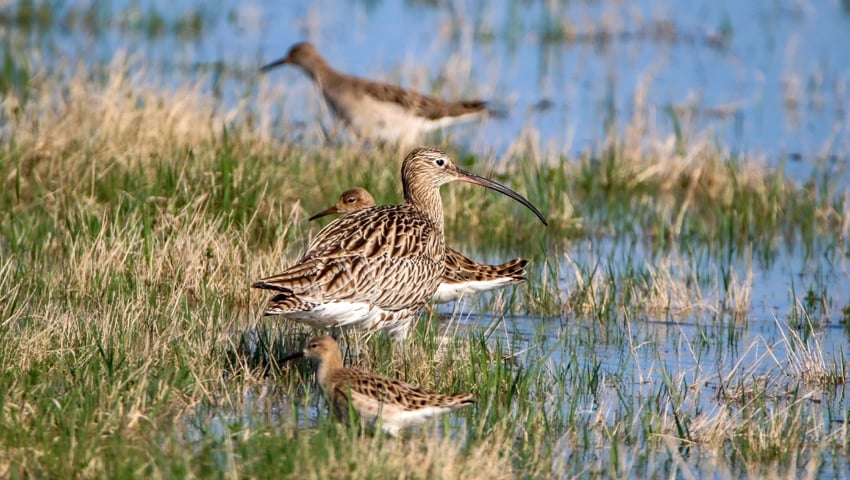A new and innovative conservation grazing method, using sheep fitted with ‘Nofence’ collars, is being trialled at RSPB Geltsdale in Cumbria.
Just in time for the ground nesting birds breeding season, it is hoped that three of Britain’s native species will benefit from this new technology and that a flock of Herdwick Sheep will help to create the ideal nesting habitats for some of the UK’s most threatened and much-loved farmland birds at RSPB Geltsdale. Lapwing, Curlew and Skylark are on the UK red list, which means they are at the highest level of conservation concern.
These birds like a good view of what’s around them so that they can look out for predators such as foxes and crows and need to nest in open ground. A key problem in large areas of the uplands is that rush pastures, unless regularly grazed, can grow dense and deter these species from nesting.
A flock of 22 Herdwick sheep have been grazing a 26-acre ‘Nofence’ enclosure since February, to help ensure the areas where the birds prefer to nest are now in perfect condition for them. Since the sheep have now left the area, already Curlew, Lapwing and Skylark have been sighted nesting and the first Lapwing chicks are expected to hatch within the next couple of weeks.
‘Nofence’ is the world’s first virtual fence designed for controlling where animals graze and the system consists of an app and a collar where the two communicate with each other over the mobile network. It means that animals can be kept within a designated area, using this virtual fencing technology. An electric non harmful pulse is triggered initially but the sheep soon learn to follow the audio warning preceding this.
RSPB Geltsdale is a large nature reserve in the North Pennines comprising two upland farms, Geltsdale and Tarnhouse, both over 2000 hectares in size and is an important site for demonstrating how upland habitat management can help reverse the declines of threatened wildlife to create a thriving and diverse upland ecosystem.
The sheep have learned to listen to the audio sounds delivered by their collars which divert them to areas to graze and they will happily nibble any new rush growth and cover the area with dung, which in turn attracts the invertebrates, such as beetles, flies, and earthworms which the birds like to eat.
Curlews, Lapwing and Skylark are all rapidly declining in the UK, since 1995 Curlew and Lapwing have both declined by nearly 50% and Skylark by 14% due to a range of factors including habitat loss and climate change.
RSPB Geltsdale is now mid-trial and early signs are that this new sheep grazing method will deliver results.
Ian Ryding, Warden, RSPB Geltsdale, said, “Curlews, Lapwing, Skylark, and other ground nesting birds urgently need our help. Already these birds are nesting, sitting on their eggs, so this is encouraging to see, and the first Lapwing chicks are expected in the next couple of weeks.”
Ian Bell, who owns the sheep, has been tenant Farmer at Tarnhouse Farm, at RSPB Geltsdale since 2016. He and his partner manage a total of 7,000 acres across the two farms, focusing on producing sustainable food in balance with nature, whilst running a viable business alongside protecting and enhancing the land for nature recovery, habitat creation and biodiversity.
Bell said, “I must admit I was sceptical at first as to how our sheep would respond. But this new ‘Nofence’ technology is a game-changer. We want to manage the land to create a mosaic of habitats rich with wildlife and show how nature friendly farming can enrich the landscape.
“Herdwicks are notorious escape artists and certain individuals have a complete disregard for field boundaries, however, we have managed to train the sheep to go exactly where we want them to. The technology appears to be better than a stonewall!”
The ‘Nofence’ collars have been purchased via the North Pennines National Landscape’s Fellfoot Forward Landscape Partnership Scheme, funded by The National Lottery Heritage Fund.
RSPB Geltsdale’s expert conservation team works with farmers, like Ian Bell, and land managers to benefit wildlife on their land and create opportunities for wildlife to flourish in the wider landscape. Bell was also a winner of the inaugural Farmland Curlew Award in 2023 for his efforts to help protect this endangered species.
Through the Curlew LIFE project, launched in October 2020, The RSPB is also working with land managers and farmers across the UK, to help improve habitat and raise awareness of conservation issues facing this rare bird.
If successful it is hoped this sheep grazing concept could also be used on limestone grassland which needs grazing at different times of year, to encourage wildflowers to flourish.
